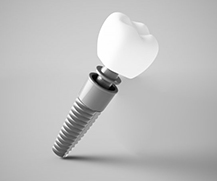Dentures – Ellicott City, MD
Classic Tooth Replacement at Its Finest

Every tooth is vital for you to chew a diversity of foods while pronouncing your words clearly. Not to mention, your teeth are invaluable to your self-esteem and your oral health. Unfortunately, despite several advancements in dentistry, tooth loss is a prevalent problem. When living with several missing teeth or complete tooth loss, you need an effective solution to restore your oral functions and your quality of life. Your dentist has the treatment you need using partial or full dentures in our Ellicott City, MD dental office.
Why Choose Ellicott City Smiles Dental Group For Dentures?
- Experienced Prosthodontist on Staff
- Dental Insurance Accepted
- Friendly, Comfortable Dental Office Environment
Who's a Good Candidate for Dentures?

Almost anyone with missing teeth can be an excellent candidate for dentures. The process begins with scheduling a consultation at our office in Ellicott City, during which our dentist will examine your mouth and speak with you about your preferences to determine if you are eligible for this treatment. If you’re not ready for dentures yet, you may be able to become a suitable candidate later after receiving treatments to restore the health of your gums and jawbones.
Effects of Missing Teeth

Common causes of tooth loss include injury, infection, certain medications, and genetics. Missing teeth can lead to negative consequences such as:
- Facial sagging: Without the teeth to fill out and maintain the patient’s profile, the cheeks and lips can take on a withered and sagging appearance.
- Difficulty speaking: The teeth play an important role in forming certain words, so tooth loss can make it harder to speak clearly.
- Trouble eating: Tooth loss makes it more difficult to chew many nutritious foods, making it harder to maintain a healthy diet.
- Diminished self-esteem: Missing teeth can make a person less willing to show off their smile, leading to difficulties in the social scene and professional worlds.
What Qualifies You for Dentures?

Dentures can be an excellent solution for patients who have lost one, a few, or many teeth as well as those with sensitive teeth or extensive decay as long as the gums and jawbones are sufficiently healthy. People who wear dentures must also commit to a special dental hygiene routine to keep their appliances in great shape and mouths free from infection.
The number of teeth you are missing will ultimately determine which type of denture is the best treatment for you. Possibilities include partial dentures to replace one or a few teeth, full dentures to restore a whole arch, and implant dentures to ensure a strong and reliable fit. Dentures are often a more economical tooth replacement option for patients on a budget.
Alternative Tooth-Replacement Options

Some patients who aren’t good candidates for dentures may be better suited by other tooth restoration methods. A few of these include:
- Dental bridges: These are best suited for patients with only one or a few missing teeth in sequence, and they require healthy teeth on either side of the gap to be placed.
- Dental implants: These titanium posts are inserted directly into and naturally fused with the jawbone. While these can be quite costly, they are permanent.
Benefits of Dentures

Missing teeth can affect far more than just your smile. In fact, they can disrupt many aspects of your daily life, especially as you grow older. Thankfully, modern dentures are more durable and life-like than ever, offering a functional and highly aesthetic solution to restore your smile. At Ellicott City Smiles Dental Group, we provide high-quality, custom prosthetics designed for comfort. Whether you need a full or partial set, dentures provide numerous benefits that can help you enjoy life to the fullest. Read more below to see the many ways dentures can enhance your life beyond just tooth replacement!
Psychological Benefits

When a tooth goes missing, it often leaves a psychological scar behind. Sometimes patients feel guilty or hopeless about their situation, often falling into anxiety or depression. Missing teeth can also have a stigma of neglect or laziness surrounding them that causes embarrassment.
Dentures are an affordable way to turn this situation around by helping you look and feel your best! At our Ellicott City dental office, we love hearing how these appliances restore our patients, not just in the way they smile, but in the way they feel every day. It goes to show that a simple change can make a huge difference!
Clearer Enunciation

Missing teeth can also make certain words and sounds more difficult to pronounce, leading to slurred or unclear speech. Dentures help by providing proper tongue and lip placement, making it easier to communicate with confidence.
In fact, many patients find that, after a short adjustment period, speaking feels as natural as it ever did, and they forget they’re wearing a prosthetic. It may take a few weeks to get to this point yourself, but the more you practice, the faster you’ll adjust.
Improves Nutrition

Eating a balanced diet becomes far more difficult when missing teeth limit what you can chew. Thankfully, dentures can restore your ability to enjoy a variety of nutritious foods, including fruits, vegetables, and lean proteins. Not only does proper nutrition support your overall health, but it also improves digestion, preventing issues like acid reflux.
As with speaking, it will take some practice to balance your chewing properly. But once you get the hang of it, you’ll be able to eat nearly anything you want with proper preparation!
Preserves Oral Health

Dentures can also help protect your overall oral health in several ways. When you develop gaps in your grin, the teeth surrounding them can shift out of place, leading to bite issues and an environment that allows bacteria to thrive. With a properly fitted denture, your teeth will stay aligned, your face shape will be maintained, and you’ll have fewer places where bacteria and food particles can hide.
Expands Opportunity

Studies show that a healthy smile makes a great first impression, boosting career and social opportunities. In this way, a confident smile can open doors in both your personal and professional life! Whether you're crushing a job interview, meeting new people, or simply enjoying a conversation, these prosthetics help you present yourself with confidence.
If you’re ready to take your quality of life back, our team at Ellicott City Smiles Dental Group can help. We believe everyone deserves to feel proud of their smile, and a denture consultation could be your first step to achieving that goal.
Indications of Dentures

Depending on how many teeth you are missing and if you have any natural ones remaining, you have multiple options to complete your smile.

Partial Denture
A partial denture is recommended for those who still have a few teeth remaining. Essentially, it works like a puzzle to complete your smile. Custom-crafted prosthetic teeth are featured in a gum-colored base that is attached to a metal framework. This allows it to clip or clasp onto your remaining teeth to hold it in place. Your natural teeth must be healthy to support the partial denture.

Full Denture
Complete tooth loss is treated with a full denture which can be used for both the top or bottom arch. An impression of your mouth is taken to create an acrylic gum-colored base to hold your prosthetic teeth. Your denture attaches to your gum tissue using suction or an adhesive.
Implant-Retained Denture
As an alternative to a traditional partial or denture, you can enjoy the security of dental implants. Implant posts are surgically placed into your jawbone to act as new tooth roots. This also anchors your denture in place, so you never need to worry about slipping or irritation again.
How Dentures Are Made

Every denture will need to be customized to match a patient’s unique mouth and gum line. But what exactly is involved in creating the perfect set of prosthetics to rebuild a person’s smile? Keep reading to learn more about what makes up dentures as well as the process of how they’re developed.
What Are Dentures Made Of?

Here are the two main components that personalized dentures consist of:
- The Base: This is the structure made to look exactly like your gum line and will support your artificial teeth. The denture base can typically be constructed by using materials such as nylon, resin, and acrylic. For the most part, acrylic is the popular choice due to its ability to closely mimic natural gum tissue, allowing you to enjoy a more natural look.
- Artificial Teeth: These will be the brand-new pearly whites that will sit atop the base. In most cases, the artificial teeth will be made of either resin or porcelain due to them being able to perfectly resemble natural tooth enamel. That said, porcelain is the more popular option due to its durability and longevity. Since it can be abrasive to natural teeth, it’s usually used for full dentures.
The Denture Creation Process

- Your treatment will begin with our team taking impressions of your gum line and smile as well as measurements of your jaw. These will be used to construct a model of your mouth, which will then be sent to a dental lab so that they can fabricate your permanent dentures.
- At the lab, the technicians will use the model to create a wax replica of your gum line, which will then have the artificial teeth placed by using an articulator. They will make adjustments per your measurements before sending them to us for a fitting.
- If the dentures fit you correctly, then we’ll send them back to the lab for completion. After a series of steps to remove the wax and plaster and replace them with acrylic, the technicians will polish the final results so that they can perfectly match your natural smile.
- Once completed, the lab will send your permanent dentures for a final fitting. Our team will make any minor adjustments if necessary and double-check that they fit you perfectly and that you’re satisfied with the results before sending you on your way.
Adjusting to Your New Dentures

Dentures can take some time to get accustomed to, as your tongue and the rest of your mouth will need to get used to wearing them whenever you eat, talk, and smile. You might expect some mild soreness, but this should only be temporary. With time, practice, and patience, your prosthetics should feel much more natural. Remember to stick to softer foods while you adjust to them and exercise your facial muscles often. If you notice any changes or unusual things with your prosthetics, notify us promptly so that we can help.
Understanding the Cost of Dentures

There are various factors influencing the cost of dentures in Ellicott City, such as the type of denture, additional procedures, and your dental coverage. We help you maximize the value of your insurance policy to reduce the amount you need to pay out-of-pocket. We also accept a variety of payment options to cover any remaining balance to keep your new smile affordable. You do not need to live with the challenges of missing teeth. We can help you invest in your quality of life with dentures. Contact our dental office today to schedule your consultation for a complete smile. Read more as we go over some important information about the cost of dentures in Ellicott City.
Factors That Affect the Cost of Dentures

There are several factors that can impact the overall cost of dentures. These aspects involve:
- The number of missing teeth
- The materials your dentures will be constructed of, such as porcelain or acrylic
- Any necessary preparatory procedures (gum disease therapy, tooth extractions, etc.)
While you will want your dentures to be affordable, it’s important that they serve as reliable supports for your smile. Without the proper materials and preparation, your restorations can be at risk of easily breaking or needing more frequent replacements. For this reason, it’s best to think of dentures as a worthwhile investment for the long run.
Are Implant Dentures More Expensive?

Since implant dentures require surgically embedding titanium posts into your jawbone, they will require a higher initial cost. However, they are also more reliable on a daily basis, as they’ll be anchored to your jaw and won’t shift out of place. They can stimulate and preserve your bone, offering increased biting strength and a youthful facial structure. While traditional dentures will need to be replaced every 5 to 7 years, implant-supported ones can last you for decades! With all these factors combined, implant dentures can often save you thousands of dollars in the long run despite being initially more expensive than their traditional counterparts.
Does Dental Insurance Cover Dentures?

Most dental insurance plans cover restorative dental treatments like dentures. While it varies between policies, many of them offer up to 50% coverage. We are in-network with several dental insurance providers and can also accept out-of-network companies to help make your treatment more affordable.
Other Options for Making Dentures Affordable

Even if you don’t have dental insurance or your plan won’t cover the costs completely, we can still offer a flexible payment plan to help manage your expenses. Instead of paying the entire sum at once, you’ll be able to pay low- to no-interest monthly payments with our partners at CareCredit and Health Credit Services. With their help, you can appreciate a stress-free plan while enjoying your fully restored smile!
If you’d like to know more about the cost of dentures, feel free to schedule a consultation with our dental team today! We’ll be more than happy to answer your questions about your future restorations.
Denture FAQs

Our high-quality, personalized dentures in Ellicott City are classic tooth replacement at its finest. If you’re interested in replacing your missing teeth with this reliable restoration, we invite you to come see us for a consultation. We’ll take the time to fully explain all your options and answer all of your questions personally. In the meantime, we’ve gathered some of the most common questions we get below so you can learn more about dentures. When you’re ready to schedule an appointment, or if you don’t see the answers you’re looking for, give us a call!
How Long Do I Have to Wait to Get Dentures After a Tooth Extraction?
In some cases, we may recommend having one or more of your teeth extracted before getting dentures. Traditionally, you’ll need to wait six to eight weeks after your extraction to begin the dentures process, but every situation is unique. The exact amount of time will depend on what type of dentures you’re receiving, how many teeth you’re having pulled, and your natural recovery process. It’s essential that your gums are fully healed from the extraction process before dentures to ensure the fit is comfortable and secure. In some cases, implant dentures like All-On-4 implants can be placed on the same day as a tooth extraction, but this varies from case to case. We’ll be able to give you a personalized timeline when you visit us for a consultation.
Can I Sleep with My Dentures In?
We understand: no one wants to be caught without their teeth! However, it’s important that you take your dentures out every night before going to sleep. This serves two very important purposes. First, it takes pressure off of your gums, which improves its circulation and promotes healthy tissue without any irritation. Secondly, soaking your dentures is the easiest way to fully clean all the little nooks and crannies that could potentially harbor plaque and bacteria.
Can I Eat Steak with Dentures?
Eating with traditional removable dentures takes a bit of time and practice. When you first begin wearing dentures, we recommend sticking to a diet of soft foods and small bites. As you begin to feel more confident in your chewing abilities, you can begin to add more foods into your daily diet. While everyone is different, it typically takes patients about a month to adjust to eating with dentures. Tough meats like steak can be a challenge to eat with dentures, but you should be able to do it with ease if you take the right precautions. Cut your steak into small pieces and chew slowly, being sure to chew evenly on both sides of your mouth. Using a small bit of adhesive to stabilize your dentures can also be very helpful.
What Should I Do If My Dentures Feel Uncomfortable?
If you notice that your dentures are beginning to feel loose or uncomfortable, it may be time to have them realigned. Your mouth will naturally begin to change shape after tooth loss, which means your dentures will gradually lose their close, secure fit. If your dentures ever feel uncomfortable, don’t hesitate to give us a call right away! We may be able to readjust your dentures to improve their fit and feel. However, after about five to seven years of use, it’s likely your dentures will need to be replaced entirely.
